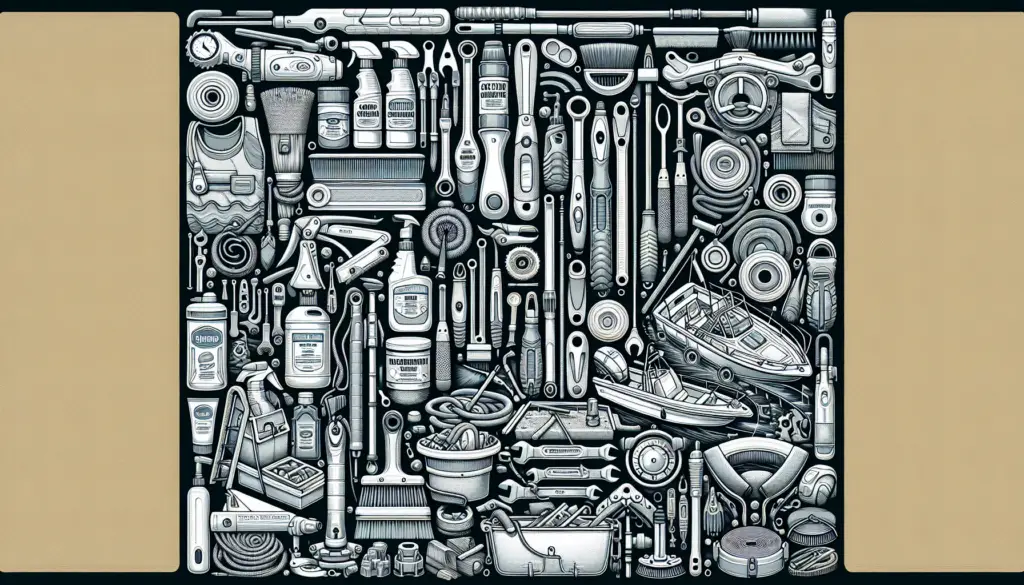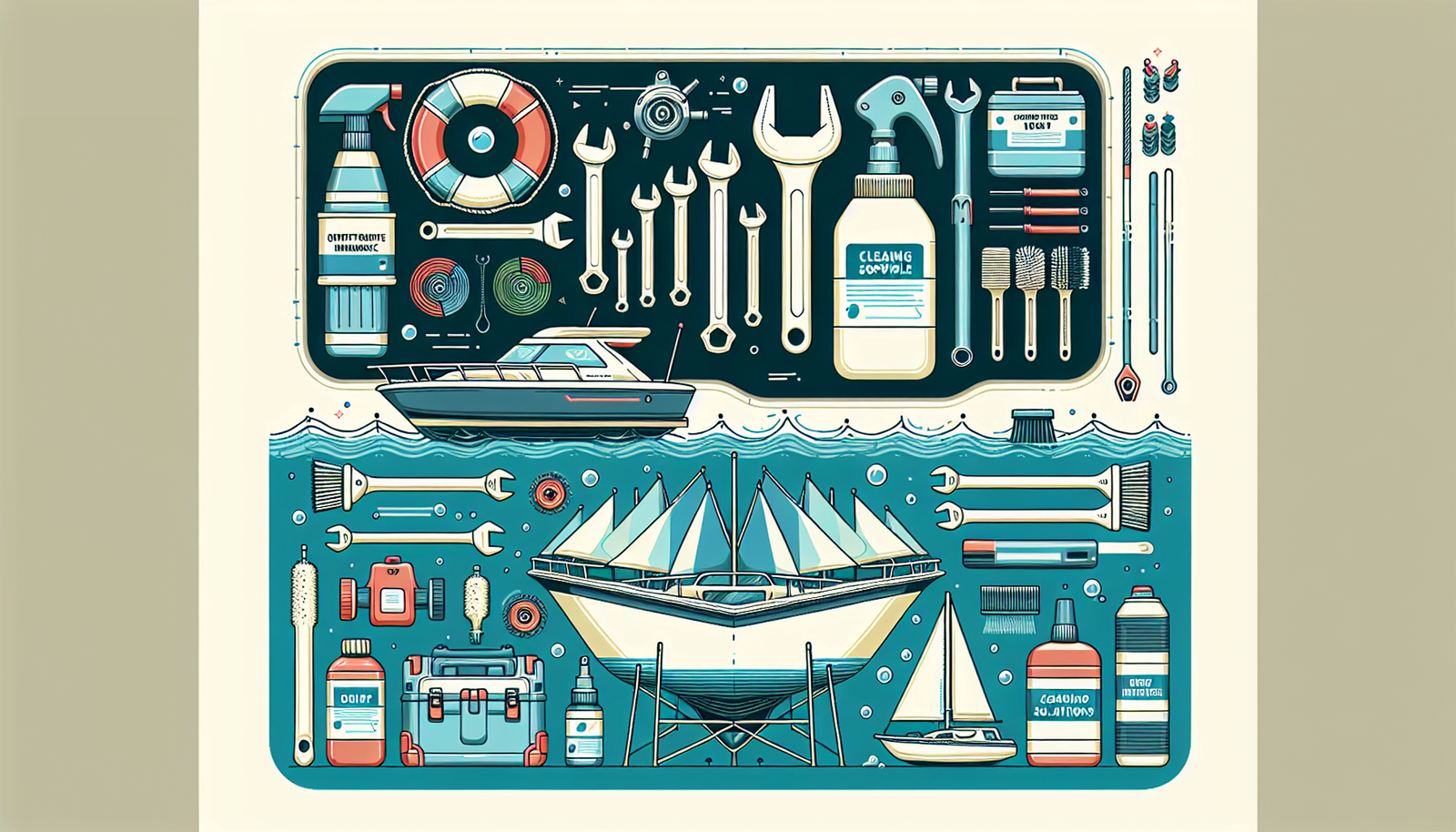In an escapist realm where the nourishing ocean serves as your road and the calling of seagulls tuning the background score, you play the most crucial role; the captain of your boat. Your voyage into “How to Properly Maintain Your Boat for Safety” unfolds an engaging narrative that offers a thorough guide on ensuring a seamless and safe journey every time you decide to ride the sea waves. You’ll navigate through an ocean of wisdom, learning skills ranging from routine inspections, repairing wear and tear, to understanding the tips and tricks for safety on board. This journey does not merely aim to equip you with the necessary knowledge to upkeep your boat, but also to ensure your stories of sunrise and sunset at sea continue to flourish safely.

Understanding the Importance of Boat Maintenance
Boat maintenance might seem like a tedious chore for some, but in the vast tapestry of adventure that is boating, it is a crucial thread. Behind every exhilarating ride, every peaceful sunset cruise, every successful fishing expedition, lies a robust regime of maintenance. Keeping a boat in perfect running order is not just about enhancing performance or prolonging its lifespan, but it’s equally pivotal in ensuring safety.
Understanding the link between proper maintenance and boating safety
Boating safety revolves around proper maintenance like the earth around the sun. A well-maintained boat is a safe one. Neglected maintenance can lead to preventable incidents, from minor problems like engine failure to major problems such as hull breaches leading to potential sinking.
The impact of neglect on the lifespan of a boat
Just like lack of care speeds the aging process in humans, neglect also shortens the lifespan of a boat. Rust, corrosion, leaks, and wear can swiftly transform a once pristine vessel into a decrepit hulk. Proper maintenance helps to spot and deal effectively with these problems, thereby extending your boat’s sailing years.
Recognizing the cost of maintenance versus repair
Whilst boat maintenance may seem costly in terms of time and resources, it pails significantly when compared to the expense of major repairs or replacements. Regular maintenance is a strategy of financial prudence, an investment securing your boat’s future, reducing the likelihood of hefty repair bills that could leave your wallet considerably lighter.
Routine Inspections
Routine inspections are the backbone of a healthy boat. These examinations allow early detection of potential problems, nipping them in the bud before they expand and escalate, causing irreparable damage.
Inspecting for damage after every use
A quick inspection after each use can ensure your boat stays seaworthy for longer. This involves looking for physical signs of damage, such as dents, leaks, or loose parts. It’s an easy habit to cultivate that can save you from dealing with bigger headaches down the line.
Scheduled thorough inspections
In addition to post-use inspections, it’s important to have comprehensive, scheduled check-ups. These scheduled inspections should scrutinize every inch, every component of your boat, even those not directly noticeable or accessible. Such thorough scrutiny forms a solid defense against insidious problems that might fester undetected.
What to look for during an inspection
Your inspection checklist should include checking for leaks, examining the hull for cracks, ensuring that the engine is running smoothly, verifying that all electronic components function correctly, and validating the operationality of safety equipment. It’s akin to conducting a health check-up, one that would declare your boat fit to face the bounties and challenges of the waves.
Cleaning and Detailing
Just as you wouldn’t wear a wrinkled shirt to an important meeting, you wouldn’t want your boat to venture out without a proper cleaning and detailing session.
How regularly to clean your boat
Cleaning your boat shouldn’t be a quarterly event. To maintain an immaculate boat, consider cleaning after every outing. This helps to preserve the aesthetics, keeps odor and stains at bay, and protects the boat’s surfaces from eroding substances like saltwater and bird droppings.
The right products to use
One can’t just use any soap or detergent to clean a boat. Select special boat cleaning products that are biodegradable and marine-safe. They cleanse effectively without causing harm to your boat or the environment.
The correct detailing technique
Detailing involves more than a cursory wipe down. Take care to scrub the deck, clean the carpet and upholstery, polish the metal, and wax the exterior surfaces. This meticulous touch enhances the glossy appeal of your boat and provides a protective layer guarding against the ravages of sun, wind, water, and time.

Engine and Propeller Maintenance
The engine and propeller are indeed the heart and soul of your boat. Their smooth function fuels the motion, making it vital to accord special attention to their upkeep.
Checking fluid levels
Regularly monitor the oil, coolant, and other fluid levels in your boat’s engine. Low or dirty fluids can cause the engine to overheat or malfunction, thereby affecting performance and potentially causing serious damage.
Assessing the propeller
The propeller converts the engine’s power into forward motion. It is crucial to inspect the propeller for dings, pitting, cracks, or distortion. Neglecting propeller damage can lead to inefficient performance and potential extensive damage to the engine.
Replacing air filters
Air filters play a crucial role in maintaining engine health by preventing dust, dirt, and other harmful particles from entering it. A clogged or dirty air filter can reduce the engine’s efficiency, increase fuel consumption and cause engine malfunctions. Ensure to replace them as per the manufacturer’s specifications.
When to seek professional help
Despite your best efforts at DIY maintenance, there will be instances where professional help will be needed. It’s wise to establish a relationship with a reliable marine mechanic for complex issues beyond routine maintenance- a guardian angel who can restore your boat’s health and vitality.
Bilge Pump Maintenance
The bilge pump, a humble yet essential piece of equipment, plays a significant role in keeping your boat afloat. It removes excess water that may find its way into the bilge, preventing it from accumulating and possibly causing the boat to sink.
Why bilge pump maintenance is essential
Its role in contributing to the boat’s buoyancy makes the maintenance of the bilge pump critical. A reliable bilge pump can potentially save your vessel from sinking during a leak or weather-related incident.
Frequency of bilge pump checks
Giving your bilge pump a quick check every few weeks can ensure that it operates smoothly. Make sure that the float switch is functioning, the pump is free from debris, and check for leaks in the hoses.
Steps to successful bilge pump upkeep
Keeping the bilge clean, preventing clogs in the bilge pump, and regularly testing its operation will aid in successful upkeep. Yearly maintenance should include replacing worn parts, hoses, and checking the electrical components.
Battery Care
A boat’s battery is the spark that ignites your boating dreams. Ignoring its care can lead to loss of performance, failure to start, and even potential electrical fires. Battery care requires regular attention to ensure your boat’s lights shine bright and the engine purrs smoothly.
The importance of regular battery checks
By conducting regular checks, you can keep this small yet vital component in perfect shape. Look out for signs of wear or corrosion, ensure the cables are secure and give your battery a clean.
Correct boat battery charging procedure
Knowing how to correctly charge your boat’s battery is crucial. Overcharging or undercharging can significantly reduce its lifespan. Always use a marine battery charger of the appropriate size and remove the battery from the boat before charging to prevent accidental spills.
Preventing and dealing with battery corrosion
Lastly, battery terminals are prone to corrosion and this can affect electrical flow. Guard against this by applying a coat of petroleum jelly or special anti-corrosion spray onto the terminals and cables.
Fuel System Care
The fuel system of your boat is its lifeline, supplying life-energizing fuel to the engine. When maintained and serviced regularly, it can ensure uninterrupted hours of cruising fun.
Why you need to check the boat’s fuel system
A digital diagnostic check of the fuel system at least once a year can help monitor fuel efficiency, tweak adjustments, and nip imminent problems in the bud. Use specialized products to clean the fuel injectors regularly, helping them to work efficiently and extend their life span.
Spotting potential leaks and damage
Small leaks or damages in the fuel system can have catastrophic results, including potential engine failure or fire. Regular inspections help identify leaks, weaknesses, or damage in the fuel lines and tank.
Winterizing the fuel system
As winter sets in, it’s not just about layering up and staying warm for you. Winterizing the fuel system ensures that it endures the cold months without damage. The common steps include filling the tank, adding a fuel stabilizer, and letting the engine run for a bit to circulate the stabilizer.
Maintaining the Boat’s Hull
The hull of your boat is the protective shell against the aggressive force of water. Keeping it in great shape is the key to a smooth and safe ride.
Checking for cracks, blisters, and damage
Regular checks for cracks, blisters, or any other kind of damage to the hull are crucial. Small damages can often go unnoticed but can develop into a more significant problem if left unattended.
Why cleaning and waxing the hull is necessary
Cleaning and waxing not just make your boat shine but also provide a protective layer against dirt, wear and tear. The friction between the hull and water is reduced, boosting efficiency, and speed.
Understanding antifouling
Antifouling is an essential process of preventing aquatic organisms from attaching themselves to the hull. These can cause drag and damage, affecting the boat’s performance and fuel efficiency.
Safety Equipment Checks
Regular scrutiny of safety equipment is a status quo of boat maintenance. It’s a silent assurance of security when sailing out into the serenity of water.
Keeping life jackets in good condition
Life jackets are your lifeline in case of emergency. Ensure they are in good working condition and are of the correct size and fit for all on board.
Flares and fire extinguisher safety checks
Flares and fire extinguishers are quintessential safety gear. Regular checks ensure they are operational and haven’t expired. Also, ensure the fire extinguisher is full and properly charged.
Maintenance of other safety gear like first aid kits and signaling devices
Other safety gears like first aid kits, signaling devices, safety ladders, or radios need regular check-ups too. Replace expired medicines in the first aid kit and test the signaling devices.
Off-Season Care
Caring for your boat doesn’t end when boat season does. Off-season care, commonly known as winterizing, is crucial to ensure your boat is ready for action when sailing season arrives again.
Proper boat storage
Storing your boat properly during the offseason can prevent damage and deterioration. Consider indoor storage options if possible. But if outdoor storage is the only option, make sure the boat is properly covered to protect it from the elements.
Managing moisture and humidity
Investing in a dehumidifier or moisture absorbing products can help keep damaging moisture and humidity at bay during the off-season. They can protect your interiors from mold, mildew, and other water-related issues.
Winterizing the engine and other systems
Take the time to winterize your engine and its systems. This includes, but isn’t limited to changing the oil, flushing the engine with antifreeze and fogging the engine to prevent corrosion. Regular maintenance of your boat safety is paramount in ensuring it remains an efficient and reliable vessel for your adventures.
There you have it, although much of this might sound arduous, these routine checks and maintenance requirements truly form a love language between you and your boat, ensuring it remains robust, attractive, efficient, and most importantly, safe.

